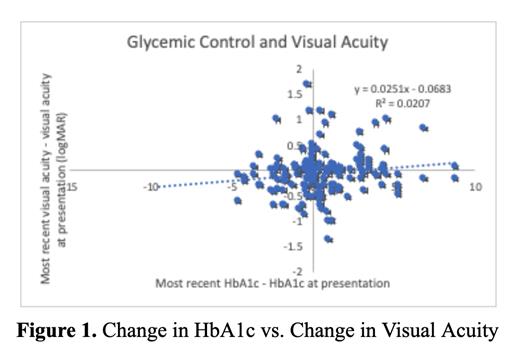Diabetes: Study From Emory University Shows That Control Of Blood Sugar Does Not Necessarily Prevent Vision Loss
Source: Diabetes Jun 27, 2020 5 years, 6 months, 1 week, 4 days, 3 hours, 10 minutes ago
Diabetes: Researchers from Emory University School of Medicine, Georgia, United States in a new study have demonstrated that blood sugar control may not protect diabetes patients from vision loss as earlier believed. The research results, however, do not deny the importance of tight blood sugar control in diabetics avoiding eye complications.
.jpg)
Individuals with diabetes can have diabetic retinopathy when high blood sugar levels over a period of time cause damage to blood vessels in the retina.
It was observed that the association between glycemic control and visual acuity may not be linear despite the good documentation of diabetes' ophthalmic sequelae. Previous studies have suggested that maintaining an HbA1c <7%. Previous studies have suggested that maintaining HbA1c <7% preserves visual acuity and controlling glycemic index may prevent the progression of diabetic retinopathy. Anjali Om, Emory University School of Medicine, Decatur, Georgia, United States, and colleagues performed a retrospective cohort analysis to determine how glycemic control in patients with proliferative diabetic retinopathy (PDR) or diabetic macular edema (DME) through a teleretina screening program affected the progression of visual acuity at subsequent follow-up appointments.
The study team reviewed a total of 271 patients with proliferative diabetic retinopathy or diabetic macular edema with visual acuities tracked for each eye (total of 542 eyes).
The study cohort consisted of patients in the Grady Healthcare System screened via one of 13 diabetic teleretina screening cameras. For further evaluation, all pathological results were referred to the Grady Eye Clinic (GEC). Patients with PDR or DME were included in the study. Glycemic control was determined by subtracting patients' most recent HbA1C at the time of data collection from HbA1C at the time of presentation. Visual acuity was measured at the first GEC visit and at 1, 3, and 6-month follow-up visits. Change in visual acuity was calculated by subtracting patients' most recent visual acuity (in logMAR) from visual acuity at presentation.

The research findings were published in the journal: Investigative Ophthalmology and Visual Science.
https://iovs.arvojournals.org/article.aspx?articleid=2769352&resultClick=1
The main key findings of the study include:
-318 visual acuities were documented at the GEC following teleretina screening.
-135 eyes had no additional follow-up and were therefore excluded from this analysis.
-Of the remaining 183 eyes, 96 were followed for 6 months, 69 for 3 months, and 18 for 1 month.
-Diligent blood sugar control did not prevent declines in visual acuity among patients with diabetic retinopathy or diabetic macular edema.
Dr Anjali Om, lead researcher from Emory University told Thailand Medical New, "Even diligent glycemic control may not protect patients from declining visual acuity. Still the importance of tight glycemic contr
ol in avoiding diabetic eye complications cannot be denied. Also there may be external factors that influence patients' progression after follow-up."
She added, "Further research with larger sample sizes should focus on identifying variables with stronger predictive values. Additional efforts could be taken to identify barriers to follow up after initial teleretina screening.”
For the latest research on
Diabetes, keep on logging to Thailand Medical News.
.jpg)
